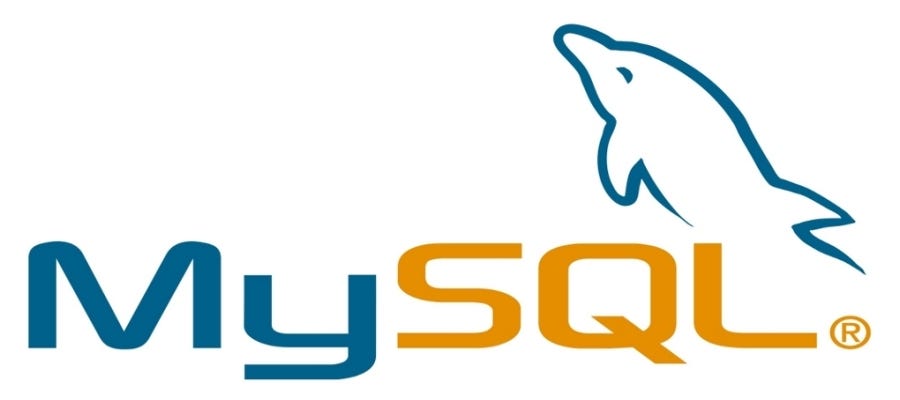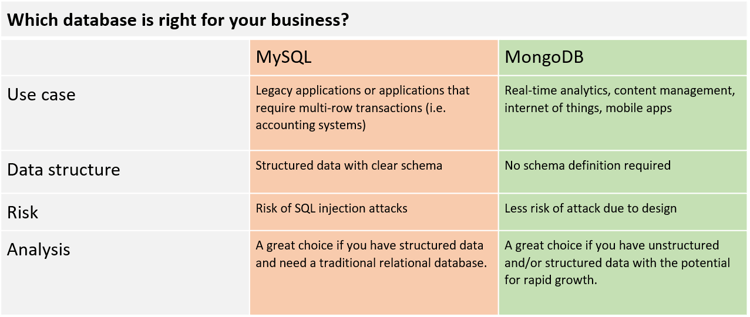With so much data available nowadays, it is almost impossible to manage it all without using a proper Database Management System (DBMS). Thankfully, there are many DBMS present in the market that can be used to fulfill your business requirements. But sometimes, choosing the most appropriate database can become a daunting task.

For many years, relational databases have seized the market, making them the optimal choice for most businesses. These include MySQL, MS SQL, Oracle, etc. They have served as a basis for a plethora of enterprise apps. But modern apps today require more scalability and diversity. As such, non-relational databases such as MongoDB have come into the picture. These are capable of dealing with massive amounts of data and are therefore replacing the current relational environment.
In this article, we will have a look at the two very popular relational and non-relational databases- MySQL and Mongo DB respectively. We will compare the two and help you understand which database better suits your business requirements. Let’s begin.
What is MySQL?

MySQL is a relational database management system (RDBMS) that has garnered immense praise and popularity over the past few years. Originally developed by MySQL AB, this database is now owned by Oracle Corporation.
MySQL stores all the data in the form of tables. It uses SQL, i.e. Structured Query Language to access the data and commands like ‘INSERT’, ‘DELETE’, ‘SELECT’, and ‘UPDATE’ to manage it. You can store related information in different tables and later connect it by using the JOIN command.
One of the best things of this database is that it is compatible with almost all operating systems, such as Apple, Windows, Unix, Linux, and many more.
What is MongoDB?
MongoDB is another popular open-source database that was developed by 10 gen in 2007. Some years later, it came to be known as MongoDB Inc. It is a popular No SQL database that is currently used by many organizations.
MongoDB creates and stores data in JSON -like documents that may have distinct structures. To improve efficiency and query speed, the database can store all the related data together that can be easily accessed using MongoDB query language. Additionally, MongoDB is schema-free. This evades the need to define the document structure before its creation. These documents can be easily altered by adding or deleting fields.
Besides, the JSON format allows for seamless transfer of data between web apps and servers with the use of human-readable format.
Pros and Cons of MySQL and MongoDB
Well, comparing the two databases isn’t very easy as both come with their own set of advantages and disadvantages. However, MySQL vs. MongoDB has become a very hot topic of debate. Below are some of the notable pros and cons of the two databases that can help you in underlining the importance of each.
MySQL
Pros
o Mature Solution
o Stable, reliable and powerful
o Atomic transactions support
o Round the clock up time
o JOIN support
o Privilege and password security system
Cons
o Poor performance scaling
o Offers auto-sharing
o High scalability
o Document validation
o Easy environment setup
o Full technical support
Cons
o No support for transactions
o High memory usage
o Young solution
MongoDB vs. MySQL: Identifying the Best Fit

A mature relational database or a young, non-relational system. Which one should you choose?
Let us compare the two databases side-by-side in different scenarios to identify the most suitable fit for your business needs.
Complex Queries
When it comes to handling query intensive complex databases, MySQL definitely surpasses MongoDB. The queries are much more powerful in MySQL. Also, at a high level, MongoDB doesn’t possess the standard interface to deal with complex queries.
Data Storage
If your business requires handling big data, MongoDB should certainly be your go-to option. It is extremely effective at handling hierarchical data as it deploys the key-value pair way of storing data.
Scalability
MySQL is vertically scalable. This implies that an increase in load can be handled by increasing the RAM, CPU, SSD, etc. on the same server. On the other hand, MongoDB can be scaled horizontally. Thus, the database can handle increased traffic by increasing the number of servers.
Transactional Applications
MySQL is more stable, reliable and offers complete data security and integrity. Thus, it is a more appropriate solution for handling complex transactional applications. MongoDB, on the other hand, is slightly unstable and provides limited scope, making it an unsuitable option for transactional applications.
Final Words
The above discussion points out the various pros and cons of both the databases. To end the debate between the two, you have to take into consideration your business goals and project requirements.
MySQL is widely used for its high performance, reliable security parameters, flexibility and management ease. Proper data indexing can help you address concerns related to performance and ensure robustness. However, if your data is complex and unstructured, or if you cannot define your schema in advance, you can opt for MongoDB. Also, if you are looking to store large amounts of data, MongoDB should be your top choice.





